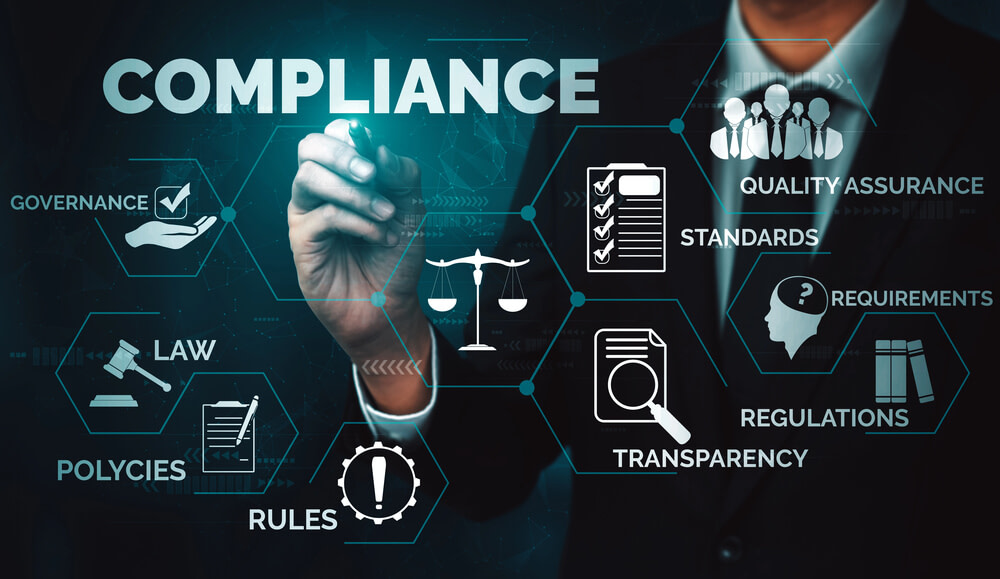What Does a Strong Compliance Program Look Like for a Credit Union?
A strong compliance program is important for a credit union because it helps ensure that it operates within the legal and regulatory framework. This helps to minimize the risk of fines, legal action, and reputational damage. A strong compliance program also helps to protect the financial stability and interests of the credit union’s members. Additionally, having a solid compliance program demonstrates a commitment to ethical and responsible business practices, which can enhance the credit union’s reputation and strengthen customer trust.

Legal and regulatory compliance
Legal and regulatory compliance refers to the process of adhering to the laws and regulations that govern the operations of a credit union. The laws and regulations affecting credit unions can vary depending on the jurisdiction. Still, they typically include consumer protection laws, anti-money laundering regulations, data privacy regulations, and financial reporting requirements, among others.
Credit unions must comply with these laws and regulations to avoid fines, legal action, and other consequences that can harm the credit union’s financial stability and reputation. A strong compliance program helps ensure that the credit union is aware of its obligations and has processes to meet them, reducing the risk of non-compliance.
In addition to avoiding penalties, being in compliance with the law and regulations can also have positive impacts on a credit union’s reputation and financial stability. For example, demonstrating compliance can improve customer trust, which can, in turn, lead to increased business and improved financial performance. Compliance with regulations can also help to prevent financial losses and negative impacts on the credit union’s operations, supporting long-term stability and success.
Financial Stability
Financial stability refers to the ability of a credit union to maintain its operations and meet its financial obligations over time. It is a crucial aspect of a credit union’s overall health and sustainability.
Various factors, including asset and liability management, risk management practices, and overall financial performance, influence a credit union’s financial stability. A strong compliance program can help ensure that the credit union operates within the legal and regulatory framework, reducing the risk of fines and legal action that can harm its financial stability.
In addition, a robust compliance program can help the credit union identify and manage potential risks that could negatively impact its financial stability. For example, by implementing strong anti-money laundering controls, the credit union can reduce the risk of financial losses resulting from illegal activities.
Maintaining financial stability is crucial for a credit union to fulfill its mission of serving its members and supporting its community. A strong compliance program can be essential in achieving and maintaining financial stability by reducing risk, enhancing reputation, and improving financial performance.
Reputation
Reputation refers to the perception and image of a credit union in the eyes of its stakeholders, including its members, customers, regulators, and the general public. A credit union’s reputation is built over time through its actions, products and services, and interactions with stakeholders.
Having a strong reputation can have many benefits for a credit union, including the following:
Customer trust: A good reputation can improve customer trust, making it easier for the credit union to attract new members and retain existing ones.
Increased business: A positive reputation can drive increased business, as customers and potential members are more likely to choose a credit union that is well-regarded.
Improved financial performance: A strong reputation can lead to improved financial performance, as the credit union benefits from increased business, reduced risk, and improved customer loyalty.
A strong compliance program can play an important role in building and maintaining a positive reputation. By demonstrating a commitment to ethical and responsible business practices, a credit union can enhance its reputation and strengthen customer trust. Additionally, by complying with laws and regulations, the credit union can reduce the risk of legal action and negative publicity that can harm its reputation.
Overall, reputation is a valuable asset for a credit union, and a strong compliance program can help to build and maintain a positive reputation, providing long-term benefits for the credit union and its members.
Risk Management
Risk management is identifying, assessing, and mitigating potential risks that may negatively impact a credit union’s operations, financial stability, and reputation. Risk management is a crucial aspect of a credit union’s overall business strategy, as it helps to ensure that the credit union is prepared for potential threats and can respond effectively if they materialize.
Credit unions face various risks, including financial, operational, and reputational risks. For example, financial risks may include market fluctuations, loan defaults, or changes in interest rates. Operational risks may include cyber security threats, natural disasters, or supply chain disruptions. Reputational risks may include negative publicity, loss of customer trust, or loss of reputation.
A strong compliance program can play an essential role in risk management by:
Identifying potential risks: A compliance program can help to identify and assess the risks that the credit union may face.
Mitigating risks: A well-designed compliance program can provide guidance and tools for mitigating risks, reducing the likelihood of negative impacts on the credit union’s operations and financial stability.
Supporting informed decision-making: A compliance program can provide valuable information and insights to support informed decision-making and risk management strategies.
Overall, effective risk management is essential for a credit union’s long-term success, and a strong compliance program can play an important role in identifying and mitigating potential risks and improving the credit union’s financial stability and reputation.
Improved Decision Making
Improved decision-making refers to the ability of a credit union to make informed, effective decisions that support its mission and achieve its goals. Improved decision-making can result in increased efficiency, better outcomes, and reduced risk.
A strong compliance program can support improved decision-making by providing valuable information and guidance to credit union management and staff. For example, by keeping the credit union informed of changing laws and regulations, the compliance program can help ensure that it is making decisions that align with its obligations and reducing the risk of penalties and legal action.
Additionally, a robust compliance program can help the credit union assess and manage risk, providing a foundation for informed decision-making. By understanding the potential impacts of risks and having processes in place to mitigate them, the credit union can make decisions that are better aligned with its goals and priorities.
Overall, improved decision-making is crucial for a credit union to achieve its mission and support its members and community. A strong compliance program can play an important role in providing the information, guidance, and tools needed to support informed, effective decision-making, reduce risk, and enhance financial stability and reputation.
Does Your Compliance Program Need Attention?
a strong compliance program is important for credit unions for several reasons, including legal and regulatory compliance, financial stability, reputation, risk management, and improved decision-making. By implementing a robust compliance program, a credit union can ensure that it operates within the legal and regulatory framework, reducing the risk of penalties and legal action. In addition, a strong compliance program can help to maintain financial stability, improve reputation, and support informed decision-making, thereby enhancing the credit union’s ability to achieve its mission and support its members and community.
In light of these benefits, it is important for credit unions to prioritize the development and implementation of a strong compliance program that aligns with their goals and priorities. A well-designed compliance program can provide a foundation for the credit union’s continued success and long-term viability.
At Compyl, we help businesses of all sizes understand and address their security and compliance programs. Contact our team today for a free gap assessment and to see how quickly Compyl can mature your program today.



